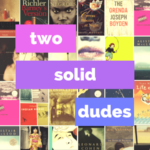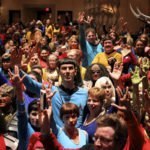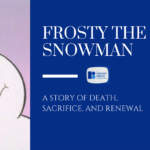It’s been a pretty lackluster summer at the box office unless you’re a fan of Marvel superheroes or photo-realistic lion CGI. Luckily, one of my most anticipated films of the year was released last weekend: Quentin Tarantino’s Once Upon a Time in Hollywood. It’s actually a rarity these days for a director with a distinct point-of-view to be able to shoot a film with a hefty budget and an original screenplay and get a prime, mid-summer release date.
So, in honor of that occasion — and because I’ll take any opportunity to arbitrarily rank shit — I’m ranking Tarantino’s movies! I’m only including feature-length theatrical releases; no shorts and no TV shows. Even though his two-part episode of CSI: Crime Scene Investigation called “Grave Danger” is very good.
As always, my order is the only correct and object one. All others are inferior.
Honorable Mention: Four Rooms (1995) & Sin City (2005)

As I mentioned in my preamble, Tarantino has done some directing work on top of his own features. He has three scripts directed by other people — not counting his script doctor work — and they’re all worth a watch. Natural Born Killers is very much an Oliver Stone film. From Dusk Till Dawn is very much a Robert Rodriguez film. True Romance by Tony Scott is faithful enough to the script that it’s even included in the 20th-anniversary collector’s set. But there are two things he’s directed that I’d like to give an honorable mention to.
The first is Tarantino’s segment in the 1995 anthology film Four Rooms. It’s uneven, like most anthologies, but it’s a fantastic showcase for Tim Roth. Tarantino’s segment, “The Man from Hollywood,” is the best and final segment in the film. Ultimately, it’s pretty slight because it’s just a setup and punchline. It’s also an inherently intriguing story — there have been version of it on Tales from the Crypt, Alfred Hitchcock Presents, and Tales of the Unexpected — so it keeps you watching until you get to the payoff.
Sin City is a film that’s slavishly devoted to Frank Miller’s comic book, which ironically makes the scene Tarantino directs a stylistic diversion. It’s a simple scene. Dwight (Clive Owen) is driving the semi-beheaded corpse of a dead cop named Jackie Boy (Benicio Del Toro) to dispose of it. The conversation the two have is pure Tarantino. He switched up the strict adherence to the storyboards Rodriguez had and ended up making the best use of Owen and Del Toro’s talents.
10. Kill Bill: Volume 1 (2003)

So, I’m listing the Kill Bill films separately. I’m doing that for a couple of reasons. 1) I like one of them better than the other 2) until Tarantino releases The Whole Bloody Affair in an accessible format, there’s no way in hell I’m considering it one film.
Even though Volume 1 is at the bottom of my list, there’s still a lot to love here. The direction is fantastic, the fight scenes are brutal, and Uma Thurman’s the Bride is fantastic. Unfortunately — and some of this may be due to me not being well-versed in Wuxia films in general — it just doesn’t connect. The story has a great hook, and I can appreciate its heightened, almost cartoonish world, but it ultimately slides off of me. I know a lot of people consider the Kill Bill films to be Tarantino’s magnum opus, but it feels a little too slight to me. It leans on Thurman’s powerhouse performance and uses every directorial trick in Tarantino’s bag, but it still leaves me kind of cold.
09. Kill Bill: Volume 2 (2004)
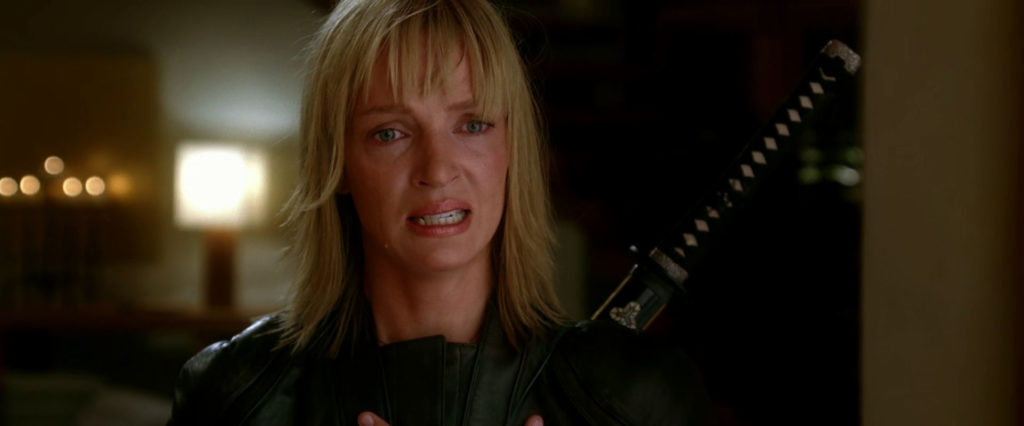
Now a western? That’s much more up my alley. Kill Bill: Volume 2 is also helped out by being the conclusion to the story, so there’s a lot of pay off. Even though the best fight in either movie is between the Bride and O-Ren (Lucy Liu). There are a lot of nice little touches in the concluding volume, though. Michael Madsen’s performance is surprising and sad and oddly touching. There’s some beautiful photography in the desert and in Mexico. Daryl Hannah and Uma Thurman continue to own the screen any time they show up, and, of course, we finally get David Carradine’s big showcase.
Tarantino is no stranger to reinvigorating fading stars and showing us why they were popular in the first place. Carradine practically oozes charm. He’s cool, calm, and badass. The finale is chattier than you’d expect from a movie with this title, but it breezes by. And the Bride gets the ending she deserves after four hours of hard-fought vengeance.
08. Django Unchained (2012)
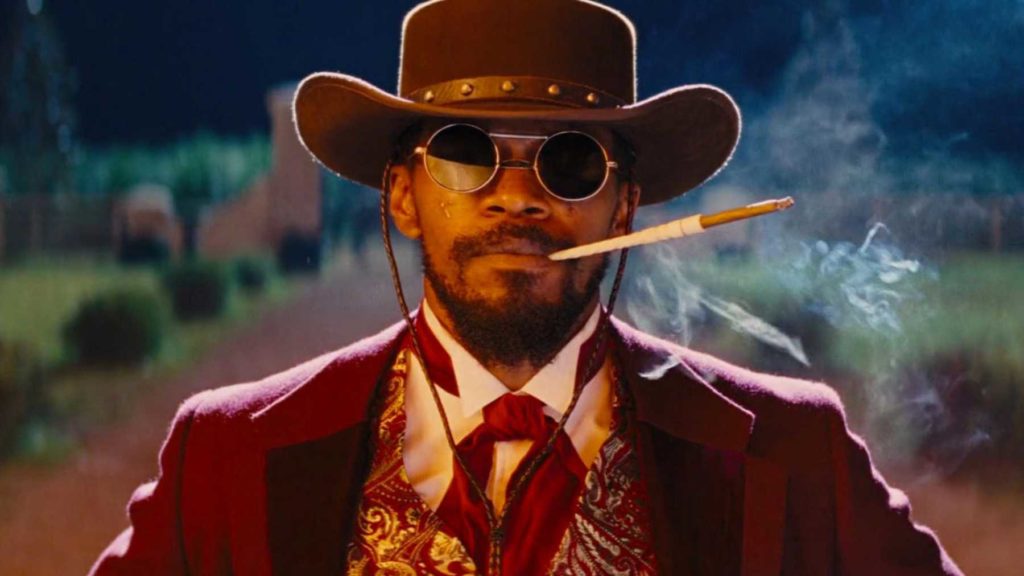
We’re only three movies deep in the list, and we’re already on a movie I consider great. Everything from here on out I enjoy greatly, I’ve watched a ton, and I highly recommend. Django Unchained might be Tarantino’s most straightforward film besides Jackie Brown.
A few things bring it down. The editing in the back half is a little wonky. Additionally, the reason for Django (Jamie Foxx) and King (Christoph Waltz) being at Candyland long enough to be found out is more forced than I’d expect from his scripts at that point. The beautiful photography and Jamie Foxx’s performance more than makeup for any deficits, though. There’s also a wild shootout full of gloriously disgusting squibs, which isn’t something you see much anymore. It’ll always get credit for that.
07. The Hateful Eight (2015)
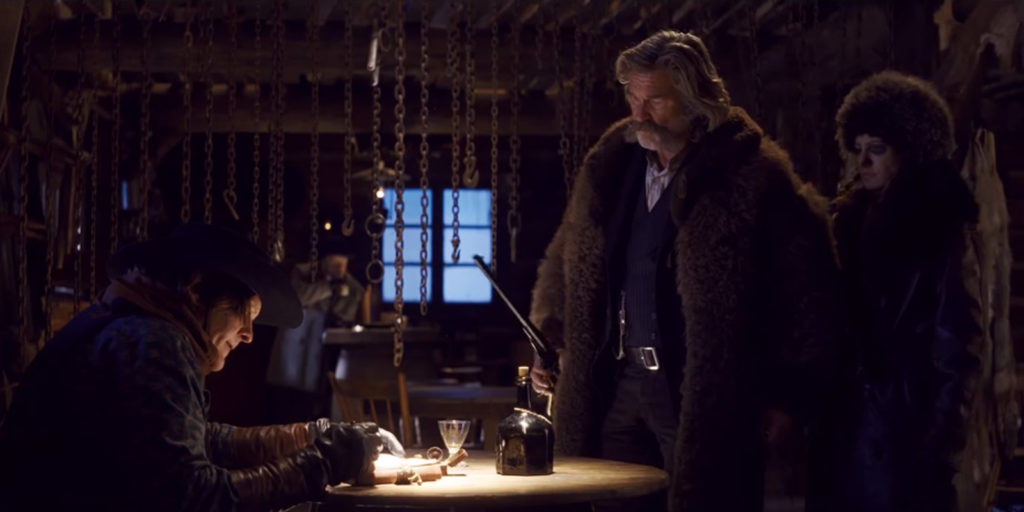
The Hateful Eight is such a weird movie that it’s somewhat hard to rank. It’s a nihilistic, western, chamber drama that also happens to be three hours long. I’ve seen it at the bottom of a lot of people’s lists. I totally get that, but I’m weirdly charmed by the entire thing.
The cast is wildly talented, with Tarantino newcomers Jennifer Jason Leigh and Walton Goggins being particular standouts. It’s also bold-as-hell to shoot a film that takes place predominantly in a horse-drawn carriage and a cabin in 70mm. The movie is, as the title suggests, pretty damn hateful, but it rarely gets credit for how funny it is too. Now, did it need to be three hours long? Absolutely not. Did I care at all? Nope.
06. Reservoir Dogs (1992)

Reservoir Dogs is probably the movie that’s hopped around my list the most. When I first saw it in high school, it was one of my favorite films. Then I thought it was amateurish and I was too good for it, so it would have been at the bottom of my list. I’m not as much of a dumbass anymore, so I love it again. It’s tight and brutal and a really impressive debut for a filmmaker.
Tarantino is helped along by an insanely stacked cast. If you had Harvey Keitel or Michael Madsen or Tim Roth on their own surrounded by a bunch of nobody actors, you’d probably still have a great film. The fact that you get all of them — plus Steve Buscemi, Chris Penn, and Lawrence Tierney — is a minor miracle. The majority of the film takes place in one building with a bunch of pissed off, tough guy criminals. It’s practically the definition of a powder keg, and it’s immensely watchable. The fact that it’s his shortest film (besides the Grindhouse version of Death Proof) helps a lot too.
05. Once Upon a Time in Hollywood (2019)

I’m sure over the years, this movie will shift either higher or lower on the list, so smack dab in the middle seems like a perfectly fitting place for it right now. I expected Once Upon a Time in Hollywood to be long, meandering, funny, gorgeous, and well-acted, but I didn’t expect it to be as sadly sweet as it is. It’s easily Tarantino’s most touching and romantic film since Jackie Brown. There’s the bittersweet nostalgia for the 1969 Hollywood that the movie wonderfully recreates, but there’s also an exploration of friendship that’s as sweet as it is unexpected.
Once Upon a Time in Hollywood has what you’d expect from a Tarantino film. There’s plenty of dialogue, lots of nerdy film history, tense scenes — Brad Pitt’s Cliff Booth visiting Spahn Ranch is an all-time scene in his filmography — and, of course, violence. But I didn’t expect the way he explored Sharon Tate (Margot Robbie). He clearly has a reverence for her as an icon, as a person, and for what her tragic, untimely death represents. There’s a lot to chew on with this movie, and I’m excited for the conversations it will continue to spark.
04. Death Proof (2007)
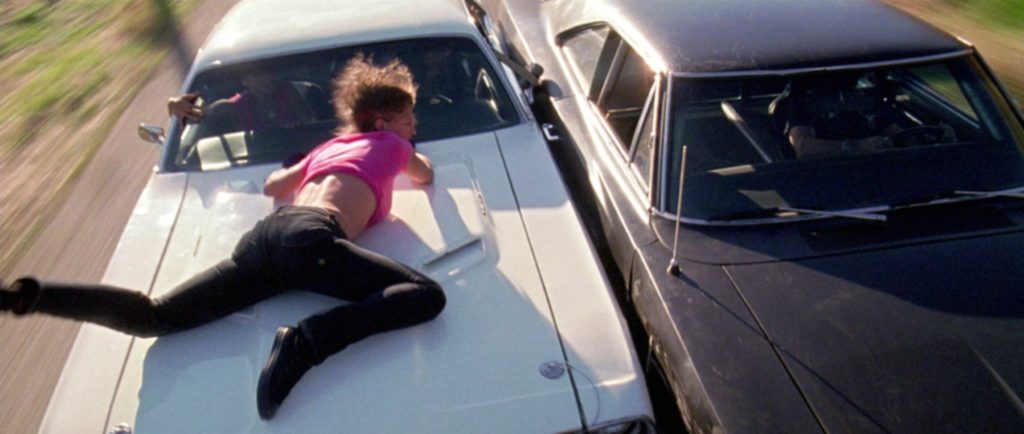
The consensus after Grindhouse came out seemed to be that Death Proof was too talk-y and boring and Planet Terror was the better, more entertaining movie. I feel like that opinion has changed, and I’m glad. Death Proof is a lean, mean throwback full of great characters, great performances and one of the best car chase scenes since … I dunno, the ‘80s?
The criticisms about the amount of build-up are totally valid. It’s a long, long time before we get our first kill courtesy of Stuntman Mike (Kurt Russell), and that’s halfway through the film. Then, we have to go through even more build-up before the action-packed finale. Luckily, those chatty character scenes are full of actors like Rosario Dawson, Sidney Poitier, and Tracie Thoms. But the real reason to watch Death Proof, and the reason it’s fourth on my list, is the finale. There’s some beautiful stunt work by Zoë Bell, some dynamic cinematography by Tarantino himself, and the kind of action that makes you literally grip the arm of your chair tight.
03. Pulp Fiction (1994)
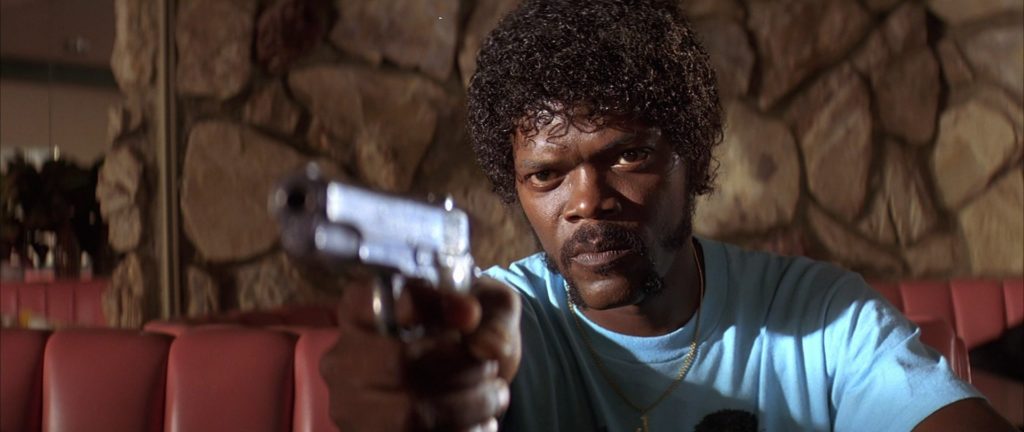
Pulp Fiction was Tarantino’s big mainstream, breakout hit. It spawned a lot of conversation, controversy, and ripoffs. Watching it 25 years later, it’s still fun and engrossing and cool as hell. It’s impressive that he manages to make a story that’s inherently shaggy and meandering seem so tightly put together.
Samuel L. Jackson and Uma Thurman are the best performances in the film. Jackson’s Jules is maybe the best character Tarantino’s ever created, and John Travolta’s career got a shot in the arm from it. Which he eventually squandered, but that’s okay. All these years later and Pulp Fiction continues to be, if not the best Tarantino film, then the most Tarantino film.
02. Jackie Brown (1997)
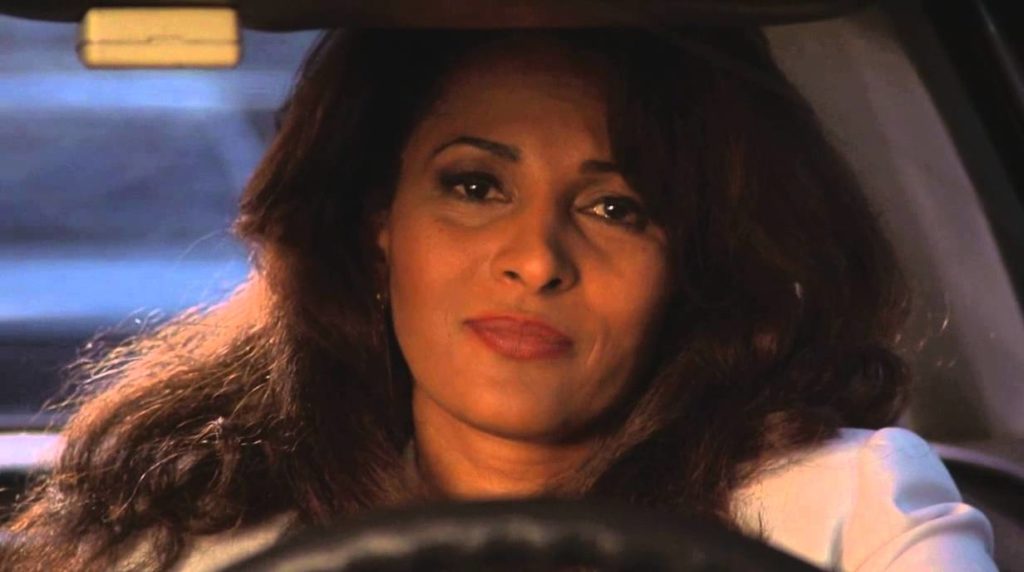
There’s been a resurgence of Jackie Brown appreciation in recent years. You can’t really call it underrated anymore, but it’s still a movie that deserves a lot more eyes on it. It’s maybe the weirdest film in Tarantino’s oeuvre — not content-wise, but structurally — in that it’s played pretty straight. He knows it’s a good story, so he presents it as clearly as possible, using his particular skills to spice up the dialogue and characters.
Pam Grier as Jackie Brown and Robert Forster as bail bondsman Max Cherry deliver two of the best, most mature performances in Tarantino’s entire filmography. There’s such weight and history behind every choice the actors make. Michael Keaton and Robert DeNiro also give fantastic supporting performances that I didn’t really appreciate until my third or fourth viewing. Jackie Brown is Tarantino’s most mature work, and I hope people who skipped it the first time around keep checking it out.
01. Inglourious Basterds (2009)

The final shot of Inglourious Basterds is Aldo Raine (Brad Pitt) and Utivich (B.J. Novak) grinning into the camera as Raine declares, “I think this just might be my masterpiece.” It’s a bold-as-hell statement to drop at the end of your film. But Tarantino is right. This movie is practically perfect. It’s a combination of a lot of the director’s favorite things: pulpy action, talky scenes, film history, unexpected violence, and amazing performances. There are at least three scenes that I think work as perfect short films on their own. My personal favorite, the meeting in the basement tavern, is an excellent example of slowly mounting tension. It’s arguably Michael Fassbender’s finest work.
I’ve watched the movie probably a dozen times. Each time there’s something new I notice, whether it’s a certain shot, a choice by an actor, or a good bit of dialogue that catches my ear. It’s his most thematically rich movie, with a lot to say about violence in movies, violence in real life, and propaganda in general. But, most importantly, I love it, and that’s why it’s Quentin Tarantino’s best film.

